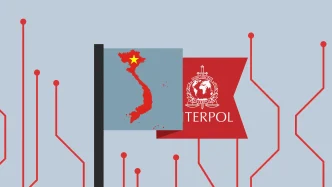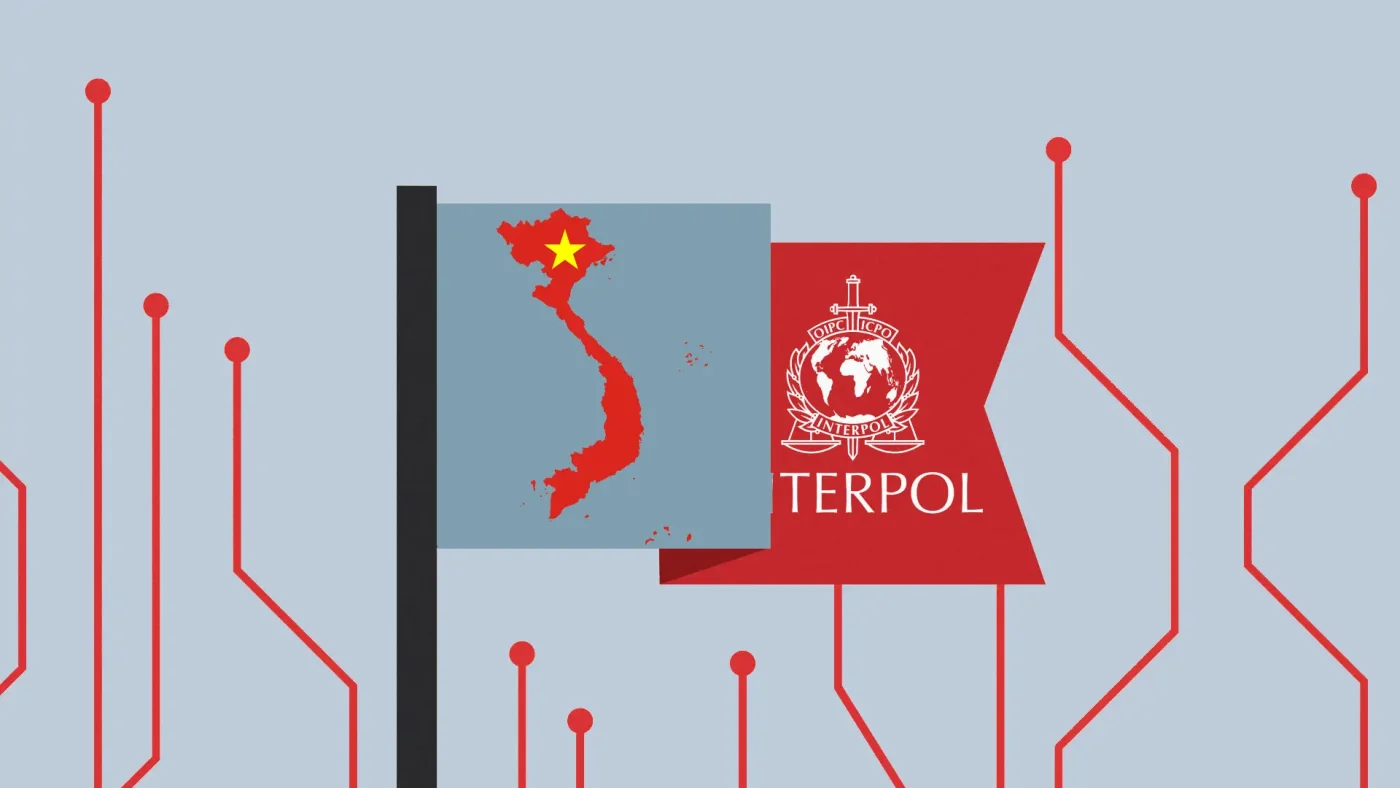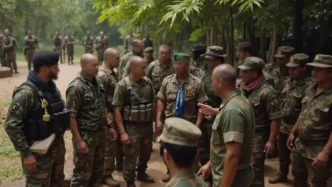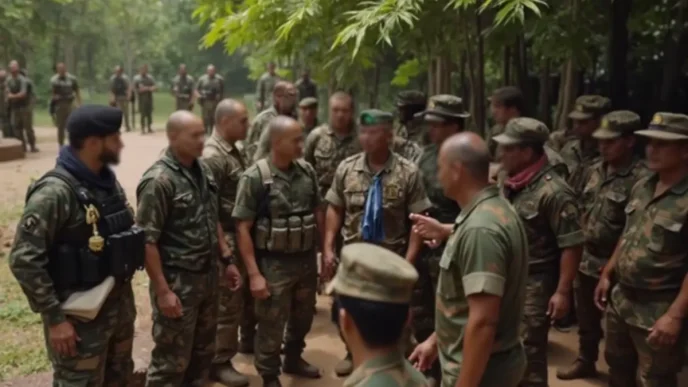In a significant display of international law enforcement collaboration, Vietnamese authorities have arrested Brown Van Donovan, a US national wanted for serious crimes, in the central city of Da Nang. The operation, conducted in early April 2025, marks a notable success in Vietnam’s growing role in tackling transnational crime, with the suspect handed over to US officials following a coordinated effort involving the Ministry of Public Security and Interpol. This case, alongside the recent apprehension of several Chinese nationals in Quang Ninh Province, underscores Hanoi’s commitment to global security partnerships amid rising cross-border criminal activity in Southeast Asia.
A High-Stakes Arrest in Da Nang
The arrest of Brown Van Donovan, a 31-year-old American born in 1994, unfolded at a fitness center in Thanh Khe District, Da Nang, after weeks of meticulous planning by Vietnam’s Criminal Police Department. According to US authorities, Donovan was the subject of a special arrest warrant issued by the US judicial system and a Red Notice from Interpol dated March 7, 2025. He faces charges of conspiracy to smuggle aliens in a manner endangering their lives, alongside prior convictions for resisting law enforcement, intentional injury, sexual assault, and child sexual abuse, as per US police records shared with Vietnamese officials.
Recognizing the potential danger posed by the suspect, Vietnam’s Ministry of Public Security deployed a specialized team from Unit 1 of the Criminal Police Department. Working alongside Da Nang’s local police and immigration authorities, nearly 30 officers were mobilized for the raid. The operation was designed to ensure the safety of officers, civilians, and Donovan himself. After pinpointing his location, authorities moved swiftly to apprehend him without incident. Following the completion of legal formalities, Donovan was handed over to US law enforcement at Tan Son Nhat International Airport in Ho Chi Minh City in early April, in full compliance with international protocols.
US officials expressed deep appreciation for Vietnam’s cooperation, commending the Ministry of Public Security, the Criminal Investigation Agency, and local police units for their efficiency and professionalism. This operation not only highlights the strength of US-Vietnam bilateral ties in law enforcement but also reflects Vietnam’s broader commitment to combating international crime within its borders.
Parallel Operations Target Chinese Nationals
In a separate but related development, Vietnamese authorities also detained five Chinese nationals in Quang Ninh Province, near the northern border with China. Identified as Li Biao (born 1995), Li Cong (born 1972), Chen Cheng (born 1976), Xu Jianhua (born 1991), and Gao Dezhong (born 1977), the group was wanted by China’s Ministry of Public Security for alleged involvement in illegal gambling operations and counterfeiting product labels. Having fled to Vietnam to evade capture, their presence was flagged through coordinated surveillance by the Criminal Police Department, Interpol Vietnam, the Immigration Department, and Quang Ninh Provincial Police.
After confirming their identities and the charges against them with Chinese authorities, Vietnamese officials completed the necessary legal procedures and handed over the suspects at the Huu Nghi International Border Gate in Lang Son Province. This operation further illustrates Vietnam’s pivotal role as a partner in regional security, addressing criminal networks that exploit porous borders and complex jurisdictional challenges in Southeast Asia.
Vietnam’s Evolving Role in Global Security
The successful apprehension and extradition of these foreign nationals come at a time when Vietnam is increasingly positioning itself as a key player in international law enforcement. Historically focused on domestic security priorities, Hanoi has, in recent years, expanded its cooperation with global agencies like Interpol and bilateral partners such as the US and China. This shift is partly driven by the growing complexity of transnational crime in the region, including human trafficking, cybercrime, and organized gambling rings, which often exploit Vietnam’s strategic location as a transit hub between East and Southeast Asia.
Experts suggest that Vietnam’s willingness to engage in such high-profile operations signals a broader strategic intent. By aligning with international partners, Hanoi not only strengthens its diplomatic ties but also enhances its capacity to address domestic security threats that often have cross-border dimensions. For instance, the arrest of Donovan in Da Nang—a popular tourist destination—underscores the need to safeguard Vietnam’s image as a safe and stable hub for visitors and investors, even as it contends with the presence of foreign fugitives.
Moreover, the collaboration with China in Quang Ninh Province reflects a delicate balancing act. While Vietnam maintains a complex relationship with its northern neighbor, often marked by territorial disputes in the South China Sea, cooperation on criminal matters offers a pragmatic avenue for engagement. This dual approach—working with both Western and regional powers—demonstrates Hanoi’s nuanced foreign policy, prioritizing security and stability over ideological divides.
Challenges of Transnational Crime in Southeast Asia
The cases of Donovan and the Chinese nationals highlight the broader challenges of tackling transnational crime in Southeast Asia, a region characterized by diverse legal systems, varying levels of law enforcement capacity, and significant cross-border movement. Criminals often exploit these disparities, seeking refuge in countries with weaker extradition frameworks or limited resources for international cooperation. Vietnam, with its rapidly growing economy and extensive border regions, has become both a target and a transit point for such activities.
Human trafficking, in particular, remains a pressing concern, as evidenced by the charges against Donovan. The US State Department’s 2024 Trafficking in Persons Report noted that Vietnam continues to face challenges in prosecuting trafficking networks, despite recent legislative reforms. While Donovan’s arrest is unrelated to ongoing trafficking cases within Vietnam, it raises questions about the country’s role in disrupting broader networks that endanger vulnerable populations. If confirmed, his alleged involvement in smuggling aliens could shed light on undetected routes and methods used by criminal syndicates operating in the region.
Similarly, the presence of Chinese nationals involved in illegal gambling and counterfeiting points to the pervasive issue of organized crime spilling across borders. Such activities often rely on sophisticated financial networks, making them difficult to dismantle without coordinated international efforts. Vietnam’s actions in Quang Ninh suggest a proactive stance, but sustained progress will require deeper investment in intelligence-sharing and capacity-building among ASEAN member states.
Public and Diplomatic Reactions
The arrests have drawn mixed reactions within Vietnam and abroad. Domestically, many Vietnamese citizens view the operations as a positive step toward enhancing national security, particularly in tourist-heavy areas like Da Nang. Social media posts on platforms like X reflect a sense of pride in the country’s ability to handle high-stakes international cases, though some users expressed concern about the potential risks of harboring foreign fugitives unnoticed for extended periods.
Internationally, both the US and China have publicly acknowledged Vietnam’s efforts. The gratitude expressed by US law enforcement underscores the potential for deeper security collaboration, possibly extending to joint training programs or intelligence-sharing initiatives. Meanwhile, China’s response reinforces the importance of Vietnam as a partner in addressing shared regional challenges, despite lingering geopolitical tensions.
Legal and Ethical Considerations
While the operations were conducted in accordance with legal and diplomatic protocols, they also raise important questions about the ethical dimensions of international extraditions. Ensuring the rights of suspects during arrest and handover processes is critical, particularly in cases involving serious charges like those faced by Donovan. Vietnamese authorities have emphasized that all procedures were followed meticulously, but independent monitoring of such transfers remains limited, prompting calls for greater transparency in how cross-border cases are handled.
Additionally, the reliance on Interpol Red Notices—while effective—carries potential risks, as these alerts are sometimes subject to abuse by states seeking to target political dissidents rather than genuine criminals. There is no indication that Donovan’s case falls into this category, but the broader use of such mechanisms in Southeast Asia warrants scrutiny to prevent misuse and ensure compliance with international human rights standards.
Looking Ahead: A Test for Regional Cooperation
As Vietnam continues to navigate its role in global security, the successful apprehension of Brown Van Donovan and the Chinese nationals serves as a benchmark for future operations. These cases demonstrate the potential for effective cross-border collaboration, but they also highlight the persistent challenges of addressing transnational crime in a region as complex as Southeast Asia. With criminal networks becoming increasingly sophisticated, the pressure is on Hanoi—and its regional partners—to sustain momentum through enhanced legal frameworks, technological innovation, and diplomatic trust.
For now, the streets of Da Nang are quieter with one fewer fugitive at large, and Vietnam’s reputation as a reliable partner in international law enforcement has received a significant boost. Yet, as new threats emerge, the question remains: can the region build on these successes to create a more secure future for all its citizens?
















